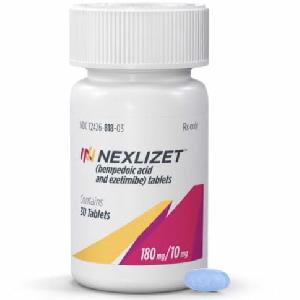Bempedoic acid/ezetimibe Side Effects
Applies to bempedoic acid/ezetimibe: oral tablet.
Serious side effects
Along with its needed effects, bempedoic acid/ezetimibe may cause some unwanted effects. Although not all of these side effects may occur, if they do occur they may need medical attention.
Check with your doctor immediately if any of the following side effects occur while taking bempedoic acid/ezetimibe:
Less common
- Ankle, knee, or great toe joint pain
- arm, back, or leg pain
- bloody urine
- body aches or pain
- chills
- cough
- cough producing mucus
- difficulty breathing
- difficulty in moving
- difficulty urinating
- dizziness
- ear congestion
- fainting
- fast or irregular heartbeat
- fever
- frequent urination
- headache
- joint pain, stiffness, or swelling
- loss of voice
- lower back, side, or stomach pain
- muscle pain, spasm, or stiffness
- pain or tenderness around the eyes and cheekbones
- pale skin
- runny or stuffy nose
- sneezing
- sore throat
- swelling of the feet or lower legs
- tightness in the chest
- troubled breathing with exertion
- unusual bleeding or bruising
- unusual tiredness or weakness
Rare
- Bone pain
Incidence not known
- Black, tarry stools
- bleeding gums
- blistering, peeling, or loosening of the skin
- bloating
- chills
- constipation
- dark urine
- diarrhea
- difficulty swallowing
- gaseous stomach pain
- hives, itching, skin rash
- indigestion
- large, hive-like swelling on the face, eyelids, lips, tongue, throat, hands, legs, feet, or genitals
- light-colored stools
- loss of appetite
- muscular tenderness, wasting, or weakness
- pains in the stomach, side, or abdomen, possibly radiating to the back
- pinpoint red spots on the skin
- puffiness or swelling of the eyelids or around the eyes, face, lips, or tongue
- recurrent fever
- red, irritated eyes
- severe nausea or vomiting
- sores, ulcers, or white spots in the mouth or on the lips
- stomach fullness
- upper right stomach pain
- yellow eyes or skin
Check with your doctor immediately if any of the following side effects occur while taking bempedoic acid/ezetimibe:
Incidence not known
- Burning, crawling, itching, numbness, prickling, "pins and needles", or tingling feelings
- discouragement
- feeling sad or empty
- irritability
- loss of interest or pleasure
- trouble concentrating
- trouble sleeping
For Healthcare Professionals
Applies to bempedoic acid/ezetimibe: oral tablet.
General
The most commonly reported adverse reactions have included upper respiratory tract infection, muscle spasms, hyperuricemia, back pain, abdominal pain or discomfort, bronchitis, pain in extremity, anemia, elevated liver enzymes, diarrhea, arthralgia, sinusitis, fatigue, and influenza[Ref]
Hematologic
Approximately 10.1% of patients had an increase in platelet count of 100x10(9)/L or more on 1 or more occasion of receiving bempedoic acid compared to 4.7% receiving placebo. Platelet count elevations appeared to be asymptomatic as they did not result in an increased risk of thromboembolic events or require medical intervention.
Bempedoic Acid:
Common (1% to 10%): Anemia, decreased leukocytes, increased platelet counts
Ezetimibe:
Postmarketing reports: Thrombocytopenia
Metabolic
Gout occurred in 1.5% of patients receiving this drug compared to 0% of placebo-treated patients.
Bempedoic Acid:
Very common (10% or more): Hyperuricemia (26%)
Common (1% to 10%): Clinically significant hyperuricemia, gout
Uncommon (0.1% to 1%): Increase in creatine kinase
Respiratory
Bempedoic Acid:
Common (1% to 10%): Upper respiratory tract infection, bronchitis
Ezetimibe:
Common (1% to 10%): Upper respiratory tract infection, sinusitis
Musculoskeletal
Bempedoic Acid:
Common (1% to 10%): Muscle spasms, back pain, extremity pain
Uncommon (0.1% to 1%): Tendon rupture
Ezetimibe
Postmarketing reports: Myalgia, elevated creatine phosphokinase, myopathy/rhabdomyolysis
Hepatic
Bempedoic Acid:
Common (1% to 10%): Elevated liver enzymes
Ezetimibe:
Postmarketing reports: Hepatic transaminase elevations, hepatitis, cholelithiasis, cholecystitis
Gastrointestinal
Bempedoic acid-ezetimibe:
Common (1% to 10%): Constipation
Bempedoic Acid:
Common (1% to 10%): Abdominal pain or discomfort
Frequency not reported: Diarrhea
Ezetimibe:
Common (1% to 10%): Diarrhea
Postmarketing reports: Abdominal pain, pancreatitis, nausea
Genitourinary
Bempedoic acid-ezetimibe:
Common (1% to 10%): Urinary tract infection
Bempedoic Acid:
Common (1% to 10%): Benign prostatic hyperplasia
Benign prostatic hyperplasia or prostatomegaly was reported in 1.3% of patients receiving bempedoic acid versus 0.1% in placebo patients.
Immunologic
Bempedoic acid-ezetimibe:
Common (1% to 10%): Influenza
Hypersensitivity
Ezetimibe:
Postmarketing reports: Anaphylaxis, angioedema, rash, and urticaria
Psychiatric
Ezetimibe:
Postmarketing reports: Depression
Cardiovascular
Atrial fibrillation was reported in 1.7% of patients receiving bempedoic acid compared with 1.1% of placebo-treated patients.
Bempedoic Acid:
Common (1% to 10%): Atrial fibrillation
Dermatologic
Bempedoic Acid:
Rare (less than 0.1%): Cellulitis
Ezetimibe:
Postmarketing reports: Rash, erythema multiforme
Nervous system
Ezetimibe:
Postmarketing reports: Headache, dizziness, paresthesia
Other
Bempedoic acid-ezetimibe:
Frequency not reported: Oral discomfort
Ezetimibe:
Common (1% to 10%): Fatigue
Renal
Bempedoic Acid:
Common (1% to 10%): Increased BUN, increased creatinine values
More about bempedoic acid/ezetimibe
- Check interactions
- Compare alternatives
- Reviews (4)
- Dosage information
- Patient tips
- During pregnancy
- Drug class: antihyperlipidemic combinations
- En español
Patient resources
Other brands
Professional resources
Other brands
Related treatment guides
References
1. Product Information. Nexlizet (bempedoic acid-ezetimibe). Esperion Therapeutics. 2020.
Further information
Always consult your healthcare provider to ensure the information displayed on this page applies to your personal circumstances.
Some side effects may not be reported. You may report them to the FDA.

